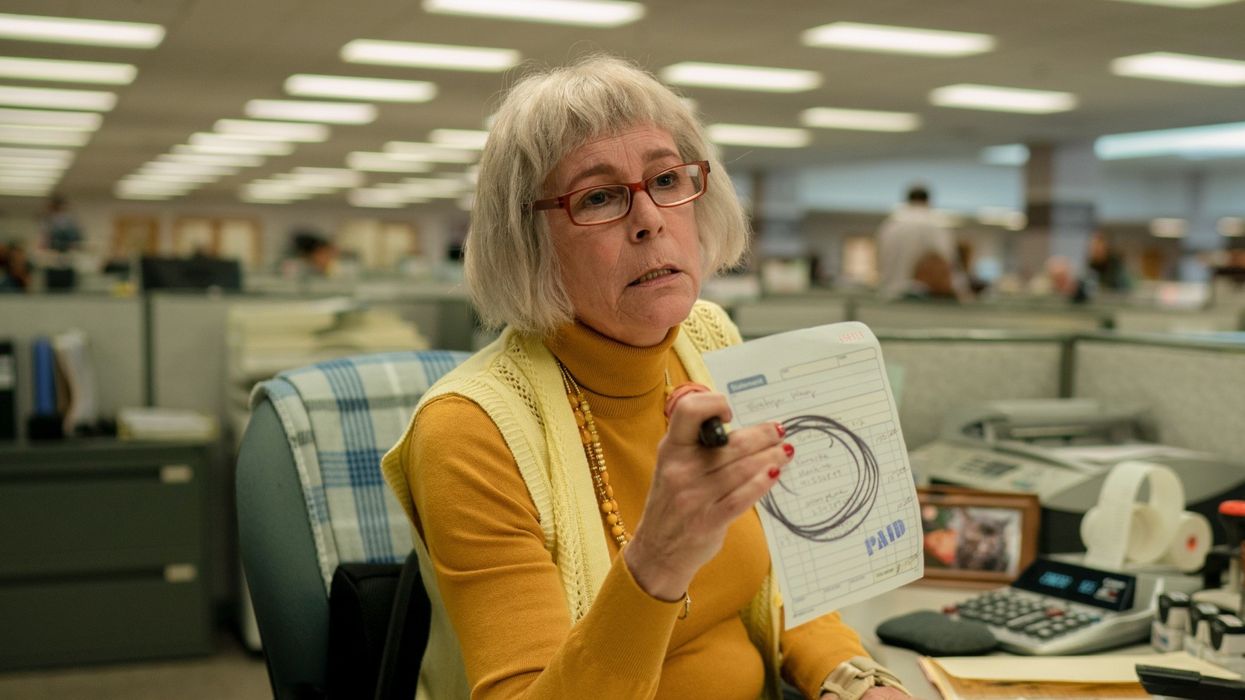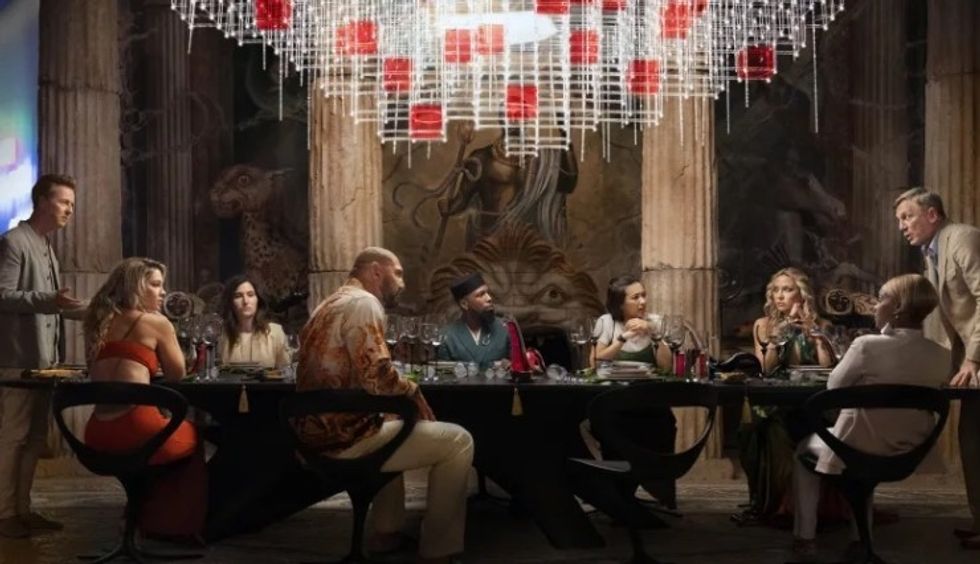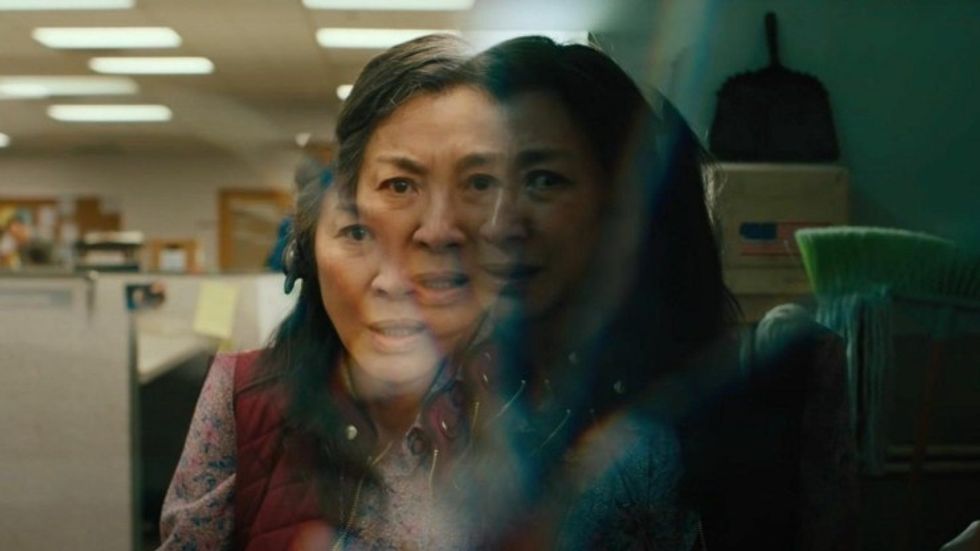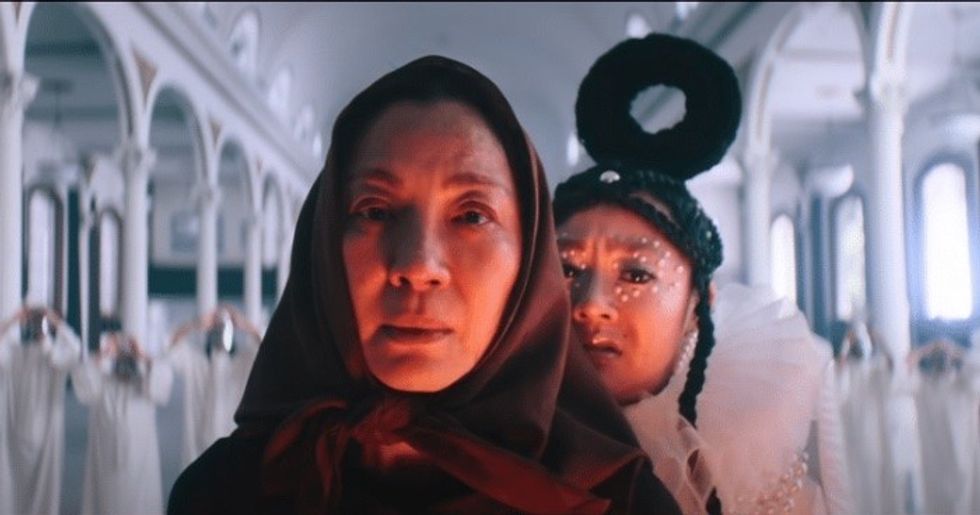What Rian Johnson & the Daniels Want Young Filmmakers To Know
This advice from three of the greatest writers/directors of 2022 might be exactly what you need.

When you get the directors of two of the biggest movies of 2022 in a room together, you’re bound to come away with some massive insights into the creative process.
Rian Johnson is the director of Glass Onion: A Knives Out Mystery, the follow-up to his genre-subverting hit, Knives Out. Daniel Kwan and Daniel Scheinert, collectively known as the Daniels, are the directing duos behind the massively successful Everything Everywhere All At Once.
In this video, released by Vanity Fair, Johnson joins the Daniels to discuss everything from tone to genre to how to create a good vibe on set. It’s a treat to see Johnson, a filmmaking vet, trading genuine questions and insights with the two relative newcomers, and you might take away a tip that will help your filmmaking career.
Here are some highlights from the discussion that we think you should know.
Don't Be Afraid to Blend Genres
We’re in a time when filmmakers are becoming increasingly bold with the genre, often cross-pollinating them or turning them on their heads altogether. These two sets of filmmakers, having demonstrated a bold and original use of genre in their work, are more than suited to discuss the topic.
What is the genre of EEAAO?
It’s not a simple question, and there’s hardly one correct answer. Johnson posits that EEAAO is a family drama set within a sci-fi movie. It’s a satisfying and true answer, but as Sheinert suggests, “I think we just did a live-action anime.”
According to Kwan, the film was intended to be a family drama that was interrupted by a sci-fi film that gets “coopted by the internet and swirled in this blender.” Yeah, that sounds about right.
Ryan Johnson’s Knives Out films work so well because they take murder mystery tropes and subvert them. As it turns out, the origin of these trope reversals traces back to the reason Johnson wanted to make murder mystery stories in the first place: his love for Agatha Christy novels.
In those novels, Johnson says, characters are constantly cracking jokes about detective cliché. This idea inspired him to put everything he had into his scripts.
“I feel like no matter what you do if a good filmmaker makes a movie, it’s like they’ve burned the pirate ship into the sea," said Rian Johnson. "They’ve used every idea they have. They’re completely washed up on the shore, empty of everything… hopefully.”

The Story Genesis
Breaking a story is a process that can look different for every writer. Some writers like to explore through trial and error, while some like to have their stories meticulously planned out.
Johnson is a writer who prefers the latter. In fact, for him, 80 to 90 percent of the work is diligently outlining his story so that he has the whole thing mapped out before he ever sits down to type.
On the other hand, the Daniels say that they are “still figuring out how to write.” This a particularly amusing statement coming from two guys who were nominated for Best Screenplay at the 2023 Golden Globes, but it shows you that no process is better than the other. The Daniels say they like to throw a ton of stuff against the wall, trying to see what sticks. They even had a chalkboard of twenty different timelines mapped out for the movie.

Find Your Film's Thesis
Too many writers are afraid of structure and think it is the foil to true creativity.
Kwan makes a great observation that structure is where the thesis of the film emerges. In that sense, the first half of EEAAO can be seen as a “chosen one” type of journey — something we’ve seen countless times. However, the second half is then a refracting of that story that says, “You are no one (but maybe there is happiness to be found even in that).”
From the beginning, the Daniels inert knew they would want the film to tear itself apart in this manner. The challenge was in figuring out how to do that.

How to Set the Tone
The three filmmakers are not talking about setting the tone of the film per se. No, the keyword here is “set.” How does a director work to establish a positive tone on their film set?
Evidently, during the filming of Johnson’s Glass Onion, the actors would opt to stay on set when they weren’t needed, rather than return to their trailers because they wanted to hang out.
From Johnson’s point of view, it’s the director’s job to make sure the set is a warm, inviting environment. It’s integral to the filmmaking process that there is communication so that everyone knows what they’re doing and why. If directors do their prep work ahead of time, they can show up with a plan and exude calm energy on set. That energy then radiates out to the rest of the cast and crew.
I’ve certainly been on my share of sets with otherwise talented directors who didn’t understand this concept. Sadly, the work suffers.
Another aspect of this concept is what Johnson calls “being an audience for your actors.” As a young filmmaker who experimented with crazy camera shots with friends, Johnson says he began to realize more and more that, no matter the camera or lighting, if what the actor was doing was working, the audience would be completely there.

Following Curiosity
What are these genre-defying filmmakers up to next? What avenues of storytelling will they chase?
Johnson says he can’t imagine mustering the energy to do a movie without feeling like it’s something he hasn’t done or seen before. The excitement and the mischievous desire of trying to get away with something are what drives him.
However, after you’ve “burned the pirate ship to the sea,” what do you do next?
The good news is that since writing EEAAO three years ago, the Daniels have had time to continue living their lives. As such, they now have an abundance of ideas that are products of new life experiences.
This final sentiment is a poignant reminder that we can’t be storytellers without first being humans. We must continue to live life outside of filmmaking so that we can continue to acquire new experiences, new points of view, and new stories to tell.
What do you think of Johnson's and the Daniels's advice?
Let us know in the comments below!
Source: Vanity Fair











